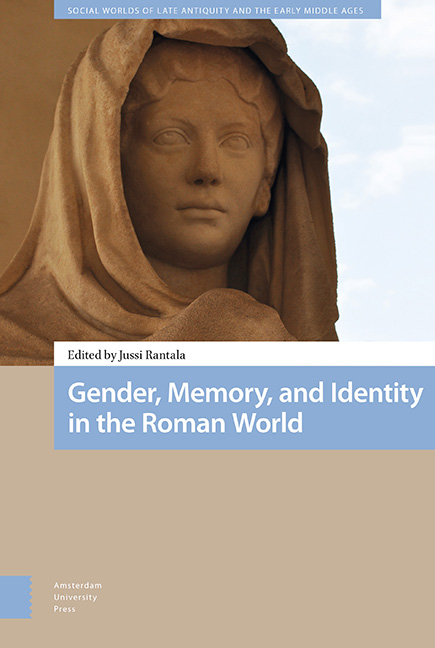Book contents
- Frontmatter
- Contents
- List of Illustrations
- Abbreviations
- Preface
- Tabula Gratulatoria
- Introduction
- 1 Public Agency of Women in the Later Roman World
- 2 Religious Agency and Civic Identity of Women in Ancient Ostia
- 3 The Invisible Women of Roman Agrarian Work and Economy
- 4 ‘Show them that You are Marcus’s Daughter’
- 5 Defining Manliness, Constructing Identities
- 6 ‘At the Age of Nineteen’ (RG 1)
- 7 Conflict and Community
- 8 Dress, Identity, Cultural Memory
- 9 The Goddess and the Town
- 10 Varius, multiplex, multiformis – Greek, Roman, Panhellenic
- 11 Mental Hospitals in Pre-Modern Society
- Index
4 - ‘Show them that You are Marcus’s Daughter’
Published online by Cambridge University Press: 20 November 2020
- Frontmatter
- Contents
- List of Illustrations
- Abbreviations
- Preface
- Tabula Gratulatoria
- Introduction
- 1 Public Agency of Women in the Later Roman World
- 2 Religious Agency and Civic Identity of Women in Ancient Ostia
- 3 The Invisible Women of Roman Agrarian Work and Economy
- 4 ‘Show them that You are Marcus’s Daughter’
- 5 Defining Manliness, Constructing Identities
- 6 ‘At the Age of Nineteen’ (RG 1)
- 7 Conflict and Community
- 8 Dress, Identity, Cultural Memory
- 9 The Goddess and the Town
- 10 Varius, multiplex, multiformis – Greek, Roman, Panhellenic
- 11 Mental Hospitals in Pre-Modern Society
- Index
Summary
Abstract
This article analyses the representational power of family relationships in the interplay of Roman Imperial ideology and its local use through the daughters of Emperor Marcus Aurelius. It offers new insights into constructions of gender in the Roman world and seeks to elaborate on the public roles of elite women in Roman society. The evidence discussed consists of public monuments that were made to honour the daughters and of Roman and Greek literature. The study demonstrates that Imperial daughters held great dynastic potential from the start and were honoured as young girls and respectable matronae, both because of their personal power and because they represented the power of the Roman emperor, their father.
Keywords: daughters, family relationships, honorific monuments, Roman emperor, social power
Introduction
Family and family relationships were one of the central ways to construct social power relations in Roman society. The importance of family was also central for the topmost figure of the Empire, the emperor. The representation of family was something emperors could use to legitimize and strengthen their position in power. Emperors utilized the imagery of their family members – women and offspring – in their public politics to refer to virtues connected to the private sphere and family life and to the continuity of their rule. From Imperial politics the imagery of family and family members was transferred to the sphere of local power discourse in Italy and the provinces of the Empire. Members of the local elite and other people of wealth and status used the imagery of Imperial ideology for their own ends. Members of city councils set up honorific dedications to members of the Imperial family in the name of their community and private people used their own money for public dedications as well.
This paper aims to study further the representational power of family relationships in this interplay of Imperial ideology and its local use through one specific family relationship: the daughters of the Roman emperor. It is a case study of the constructions of gender in the Roman world and seeks to discuss the intersection of family and power and elaborate on the public roles of women in Roman society.
- Type
- Chapter
- Information
- Gender, Memory, and Identity in the Roman World , pp. 105 - 130Publisher: Amsterdam University PressPrint publication year: 2019



